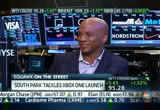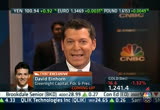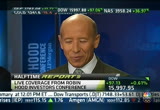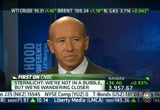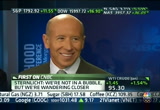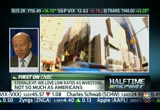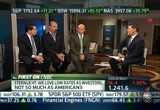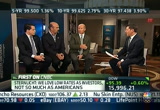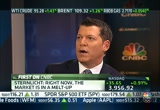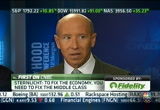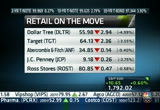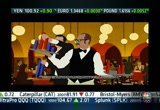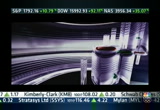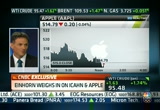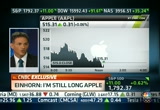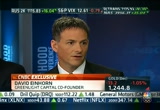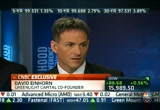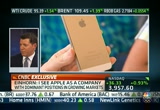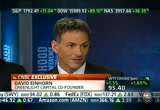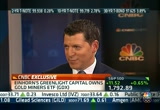tv Fast Money Halftime Report CNBC November 21, 2013 12:00pm-1:01pm EST
12:00 pm
not in trouble for the xbox. i mean, that's gone pretty well. >> yeah. >> it's some of the other stuff. it's mobile. >> yeah, bing might be a different story. interesting, cultural relevance. when you're on "south park," you have it, for sure. >> not bad to remind people the night before the launch. >> right. david einhorn with wapner on "halftime," starting now. all right, guys, thank you so much. welcome to a special edition of "halftime report." we're live today from the robin hood investors conference in new york city where some of the world's greatest investors are gathered to share their ideas and most importantly to help fight poverty in new york city. in just a short while, we're going to speak exclusively to one of the hedge fund heavyweights in this building -- david einhorn of greenlight capital. david will join us to reveal what his latest best idea is, the one he unveiled in private a short time ago. i'm also joined by the "halftime" traders, anthony scaramouche and john najarian.
12:01 pm
and josh brown will be here, as well. we're lucky to be joined by barry sternlicht, who has structured 300 investment transactions in deals valued at more than $40 billion. he's the chairman and ceo of starwood capital and starwood property trust, the largest mortgage reit in the united states. it's an interview you will see first on cnbc. barry, welcome. >> thank you. >> we'll get into the wheelhouse of real estate, but in light of what the market is doing today, the dow is up 100 points. pushing on 16,000 again. last time you were on tv, you said the following -- all my friends who are money managers are much closer to the sell button than they ever were before. is that -- >> i didn't say they were selling. >> no. >> closer. >> i said they have the panic button at hand. >> are we in a bubble? >> no, but we're -- we're wandering close. we're wandering ever closer. you know, it's a melt-up. it's affecting all of the asset classes. i am chairman of robin hood, and
12:02 pm
i'll be here all day, and i'll be here tomorrow, and doing a presentation, and we'll talk about that tomorrow, about what's happening, how it's affecting all. the asset classes. the low interest rate globally, and how investors are searching for returns everywhere. so you're getting there. actually, much like '06-'07, you'll get into the debt markets and see the first signs of excess in silly debt deals which will push equity prices higher, and if you lose the covenants and debts, you'll think we're at the bubble level. >> the equity market is not yet telling you that we're in the danger zone? i mean, you've had some smart people there, i think, questioning whether we've gotten irrational and overexuberant. >> i think in some of the internet stocks and the ipos you're seeing irrational exuberance. you're seeing silly valuations. >> what do you think the fed will do, and when are they going to do? >> very little, and never. you know, there is a practical issue that's rising, which is if you pay 4% interest on 17
12:03 pm
trillion of debt, there's no discretionary spending, we can send all of the dysfunctional senators home. there's nothing for them to do. you know, it's interesting if you extrapolate a rising interest rate curve against our federal deficit, which is now our interest expenses less than 2% on the 17 trillion, i don't know exactly how we're going to pay debt service. so keep it lower longer, and as ray dahlia said this morning, it's not having that much impact, unfortunately. it's a slow trickle-down from the wealth effect of higher asset prices into the real economy, and it's not helping the half of the united states that doesn't own a lot of assets. >> it's an interesting environment for people like you who may not love what the fed is doing, but the fact that it's still doing it to the magnitude it is doing it, but yet you're taking advantage of it, because the rates are so low and presents great business opportunities. >> yes, that's true. i mean, you enjoy it as an investor. you don't love it as an american. i mean, i think it's fantastic for those of us who have the
12:04 pm
opportunity to take advantage of these low interest rates, and buy asset, finance them long term, and interest rates we'll probably never see again, not likely. yes, you know, you get what you're handed. you do with what -- you take advantage of what you're handed. and this is extraordinary time period where globally -- we just bought shopping centers in sweden, rates are really low everywhere. >> why are shopping malls a good place to be, though? why is that a good investment to make now? there's a concern globally about the strength of the consumer, the strength of economies around the world. sweden notwithstanding. >> you have to invest in real estate at a micro level, so it's asset-specific, where you can expand it, re-tenant the property, and maybe bring in theater. i started w. hotels, and we'll do some of that stuff to the malls, make them more fun. so i think we have a strategy to the mall sector. at the other end, the internet is impacting some retailers, not all. the mall is basically reinventing itself. it's having to replace the barnes & noble with cheesecake
12:05 pm
factory. or buffalo wild wings. and they like these locations, because the road infrastructure is in place, plenty of parking, they can open quickly, they don't have to start building a new store. so the mall, as it always has, is reinventing itself, and the u.s. consumer is benefitting from lower energy costs, lower interest expense, and they're spending. i think christmas may be better than people think. >> you think it could be a surprise? >> it's a little shorter, as you know, losing a couple of days. >> it is. because there are real concerns. anthony in. >> i want to ask a little bit about what you said about the assets in the united states, and it ties in to robin hood. the educational issues you talk about in robin hood. what i worry about is the middle-class and lower middle class are really not spending at a level that can really have expansion or regrowth. is this something you're worried about, getting a 3% number on gdp? >> yeah, i spent yesterday at an educator summit yesterday at harvard, and we spent the whole day talking about this with
12:06 pm
leaders, superintendents of schools, and it's a tragedy. it's not working. and the same system is not working. and the faster we recognize that it's not working, and we're trying to plug some of the holes in the system with our giving and philanthropy through robin hood in new york city, alone, but the common core is critical. it gives us a benchmark. what's interesting yesterday we had randy weingarten from the teachers union, you had the superintendent of school of hillsborough county, and you had former governor, all lined up in seeing the common core is critical to gauge effectiveness of schools, so we can move forward. i think the implementation of what they will do if teachers aren't producing good students, they haven't agreed on the rulebook yet. you need to fix -- fix the economy, you must fix the middle class. and the middle class isn't spending, because the incomes aren't going up. we have a structural issue. one of the programs very exciting, the p. tech program, that ibm has done, they extended
12:07 pm
the high school from ninth through grade 14, and a partnership at ibm. they mechntor the students thre times a week, and producing amazing result, all of them finishing high school. >> you'll have a private solution unlike the health care system. business also have to partner with the education system, show them we have the back, because we need the kids to graduate high school and match the skillset against what's available today in the world. the jobs here in the united states, which they are not trained to do, they used to call them vocational, now we call them something else. s.t.e.m., science technology and medical fields, that we need jobs in. >> i want to get your thought on one more you sort of bubble topic. we talk about the technology bubble. what about housing? is there a housing bubble? >> i don't think so. i think in certain markets, prices got way ahead of themselves. >> is the west one of them, california? >> i think vegas and phoenix. not california.
12:08 pm
california never has real demand growth. there's jobs being created in california. but, for example, vegas is one of the worst areas in the nation for job creation since the drop of the housing crisis. a lot of investors were buying houses in this buy-to-rent strategy. >> the economies of the world and -- >> yeah, we did it, too, but we did it in florida. we did it in our mortgage reit as a company, we'll call starwood way point, which we spinning out in february from the parent, and owns 6,000 houses, spent $1 billion. but we did half florida, 25% texas. there's a theme. no taxes. no taxes in those states. so we focus more, we thought long-term capital, and people would move on the long run, you'll have an issue in the country, because the blue states are indebted, have more immigrants, that are poorer, and they have entitlements, and they're union states, and the wealthy can leave. that's how you get income inequality in some of the
12:09 pm
states. in new york city heads the way it may head, people will leave. and yet they haven't asked you -- tied you down to your house and your car and your building. you haven't -- they haven't locked you in yet. can you still move in the united states. or maybe you'll move to u.s. virgin islands. >> i appreciate you spending time with us. >> nice to be here. >> barry sternlicht. coming up, david einhorn, known for big win shorting stocks, here to reveal what he's buying, what he's shorting, and his new best investment idea. and one of his big shorts is green mountain, of course. look at that stock today. it is way up on earnings. we'll find out if mr. einhorn plans to change that position anytime soon. first, we're a week away from black friday. can you believe that? lots of movement in the retail space. we'll break down the best and worst holiday place of this season, and find out why the discounters are taking a big hit. that and much more is ahead on this special edition of the "halftime" show.
12:10 pm
12:12 pm
all right. welcome back to special edition of the "halftime report," live today from the robin hood investors conference in new york city. david einhorn will be joining us shortly. he'll reveal to us his new best investment idea. we first want to hit the "top three trades" of the day. lots of stucks on the move. yum brands is one of them.
12:13 pm
the restaurant operator will keep its china and india operations separate. josh? >> yeah, i actually like the setup here in yum. this is a stock that's growing faster than most of its peers. it's trailed the s&p substantially. but if you look at that 72 to $75 level, technically, it's failed there five times since 2012. it keeps knocking on it. it's only a matter of time before it breaks out, and once it does, this thing could really get going. >> all right. the treasury department says it has completed the sale of 70 million shares of general motors stock, and plans to sell its remaining 31 million shares, anthony, by the end of the year. >> a classic story of great management. you get the upside optionality of an improving economy. the pickup market will be huge for them and profitable. it's ten times earnings. trade could trade into the 60s. >> carl icahn is making news again, yet again, acquiring common shares in hologic.
12:14 pm
>> yeah, typical carl icahn, and typical the companies were somewhat nervous, so they've put positions in place to keep carl from getting bigger with this particular trade. i like it, judge. i think he finds a lot of great opportunities, and investors are usually smart to coattail him. in this case, this is one of those you can buy, unlike many of the ways warren buffett gets long. >> you're describing what the company was doing, and in reaction, they did adopt a poison pill -- >> yeah, he'd still finding the value, the way he did in netflix, web m.d., i'd follow him in here. i bought this one today. >> and retail from abercrombie & fitch to dollar tree, retailers are falling on disappointing quarterly reports. the one bright spot is williams-sonoma, reporting a profit of 58 cents a share. how do you trade the sector heading into the holidays? a week to go until thanksgiving. >> yeah, i think what willia williams-sonoma is telling you is what michael kors told us the
12:15 pm
other day. there are two different consumers, and the high-end consumer won't stop shopping this season. i think that if you look at all of the hiring that's happening at retailers all over the country, this could be a much better-than-expected year, versus prior years and versus what they're thinking so far. so i like the group going into the holidays. >> all right. well, goldman sachs just released its 2014 outlook for stocks, including four suggested strategies to find value. we're going to find out if the traders agree, and what your best play could be. then hedge fund heavyweight david einhorn is here to reveal his best investment idea, exclusively on cnbc. that and much more is just ahead on the "halftime report." [ bagpipes and drums playing over ] [ music transitions to rock ]
12:16 pm
make it happen with the all-new fidelity active trader pro. it's one more innovative reason serious investors are choosing fidelity. get 200 free trades when you open an account. your grass waters itself. your dishes wash themselves. so why don't your floors... ...clean themselves? the irobot braava floor mopping robot. irobot. do you? maestro of project management. baron of the build-out. you need a permit... to be this awesome. and you...rent from national. because only national lets you choose any car in the aisle... and go.
12:17 pm
12:18 pm
all right. welcome back to the "halftime report." live today from the robin hood investors conference in new york city, david einhorn just wrapped up his presentation. he is here live with us in an "cnbc exclusive." great to have you here. >> great to be here. >> micron was your big idea. why? >> well, i think it's a business and an industry that's really changing. this is historically been about the worst industry you can think
12:19 pm
of within technology. i mean, d-ram, you had literally dozens of competitors, some of them were state-sponsored, they didn't care about profits. and what's happened over the years is it's become such an awful industry that most people have left it. so that it's now consolidated and we're down to three players. micron, samsung, hynex, the three big players. a couple of years ago we made an investment in seagate. it wasn't as bad as dram, but pretty terrible, and consolidated down to seagates and to western digital, and toshiba, and once it got to three competitors, things got very rational and the economics improved and the capital spending got better and the margins got a lot better. we think micron and dram are on the way to the same type of performance next year. >> when i first heard that micron was your pick, the stock's up 200% year to date. and i said, now, wait a minute, this is a guy who's written papers before about the fed and
12:20 pm
inflating asset prices, there's no way it could be micron up 200%. >> yeah. >> how does all of that mesh? how do you still like a stock that's up that much, and you're long? >> sure. it's not a question of what the -- where the stock has been. i mean, we were short micron 10, 12 years ago. in 2001, i mean, just an awful business. and we probably shorted for two, three years in size, and never understood. but once they got to do the acquisition, and then, you look at the multiples, and youi -- t earnings power will be, we think it will be better than people think. maybe 3.50 a share, and the next year, maybe $4 a share. and at that point, if you get a reasonable multiple -- you don't need a market multiple, just a non-ugly multiple that shows sustainability of that kind of improvement, and we can do pretty well. >> how much of your perceived micron gain is at the expense of some intel pain? right? trying to get after their
12:21 pm
processor business a bit. is that part of it -- >> no, micron is mostly about dram, and it's the memory historically in computers, but now being used in smartphones, and video game consoles. it's moved away from being a primarily pc company, which is one of the nice things about it. >> i want to talk obviously about apple and green mountain, and we're do that in a second. let's start with st. joe's. you've been battling against that company for at least three years. are you still short? the name? >> yeah, we are, and it's been more than three years. we started with st. joe's i think about 2006. >> okay. so it's been a long time. >> so about seven years. the interesting thing about st. joe is it's not actually a business. what it is is a pool of land being liquidated over time. sometimes they're developing the land, sometimes they're selling the land. now, historically when they've developed the land, they've lost money developing the land, so a few years ago, they basically stopped developing the land and just concentrated on selling it. a few weeks ago, they announced that they sold two-thirds of their land, which is the main
12:22 pm
asset of the company, and they got about $5 or $6 a share for it. so i was discussing this at home, at the dinner table -- my 7th grade son, he's using pre-algebra, and he was -- he was just discussing his math that day, and st. joe kind of occurred to me, so i told him what was going on at work. i said, look, you have this company, st. joe, they just sold two-thirds of their land for $5 or $6 a share, i think i said five at the dinner table. how much is all of st. joe worth? and he thought for a minute, and he said, $7.50 a share. and i said, that's absolutely right. but its stock is at 18. sand he said, well, why is that? i said, well, you don't learn that in math. you learn that in philosophy, and maybe you'll get to that when you get to college. >> the lesson in all of that, watch out for the 7-year-old mr. einhorn down the road, for all of you hedge fund managers out there. they sold 380,000 acres of land for about 15 -- just just show of $1,500 an acre, and in your
12:23 pm
thesis all along, that was the number you had all along. so the thesis basically is they're overinflating the value of the land they're about to sell. >> well, it's what the market is. the land has been worth about $1,500 an acre. this is basically undeveloped, unentitled land in parts of florida, with poor weather, poor demographics, need a lot. they used to have beachfront property, but most of that's been developed and sold. so they're really left with less-exciting things. >> i guess, you know, someone might say, well, look, they still have a lot of land left. and that land may likely be valued at more than what they paid -- or what they were able to sell this land for. >> yeah. >> is that a fair argument to make? >> no, it really isn't. because two-thirds of the land they just sold, and they got $1,475 an acre, and they have another roughly -- a little less than a third that's worth roughly the same amount. now, i'll concede that maybe there's a couple miscellaneous
12:24 pm
assets here or there, but there's 90-something million shares outstanding, so the other assets might be worth a dollar, a two. it's hard when you look at the assets and add them up, come up with anything higher than $10 a share, and the company doesn't want to talk about any of this, so they don't want to talk when this -- >> you haven't discussed with bruce berkowitz -- >> he doesn't want to talk to me or anybody else, because i think he knows he's sitting on $18 stock, where he has a huge, huge position, but it's really only worth about 10. >> he, of course, is the largest shareholder there. let's move and talk about apple. >> sure. >> you still long? >> still long. >> you happy with the 5s? you happy with what you've seen lately? >> yes. i have a 5s. it's terrific. >> be o. i just got a flu one yesterday, full disclosure, i like it, too. are you happy with carl icahn? are you happy with what he is doing now? you were the first guy in the hedge fund game with your stature to make an issue of the money sitting on the balance sheet. >> yes. >> $150 billion in cash.
12:25 pm
>> yes. >> are you happy with what he's doing? >> well, the thing with apple is we bought the stock about three years ago. and our goal was to be sort of passive, happy holders. and eventually, the cash built up and the valuation compressed, and it kind of became out of hand. and that was -- and we had a clever idea we thought we could bring to them that would help unlock some of the value, and we went through a whole thing about that in the spring. and, you know, they hired some advisors and they went to some lengths that they probably historically hadn't gone, like issuing debt, and they issued -- they said they'd buy back $100 billion of stock and pay out that amount of dividends over three years, which is pretty good. it gives you about 7%, 8% yield effectively on the company. i think that that moves apple's, you know, capital management from, like, a d-minus to a c-plus, or something like that. so obviously, more could be done that would unlock probably even more value, but it's not so bad at this point that i really want
12:26 pm
to complain about it. >> do you think that if it came down to a proxy fight that carl could win? >> i really don't know. it depends on what he was doing and what he was proposing and how he was going about it. >> where would your vote be, with icahn or tim cook? >> i think i'd have to hear what everybody was saying. >> what's the issue, though, when someone tries to raise that entire issue with apple? it seems like you're taxed from all sides, right? remember when you sent your letter out, jack welch said i'd give david einhorn the back of my hand, and carl icahn does what he does, and everybody -- what is it about that company that people react that way? >> there is a school of people that really think that, you know, shareholders should, you know, be quiet, and if they -- if they don't like what's going on, they should simply sell their shares. and i certainly understand, and i appreciate that, and there's many times when i'm confronted with a situation, and i really don't like what's going on, and i'm quiet and i sell my shares. but other times, very, very rarely -- i mean, for me getting
12:27 pm
involved with apple in 2000 -- earlier this year, it was the first time that we made a constructive suggestion like that to a company, i think in three years. so this is a pretty -- it was a pretty rare event, and i think it was because both of the extremeness of the misallocation of the capital that was there, plus the fact that we really felt we had something to bring to the table with our own sort of clever idea with the preface as to how they unlocked the value. >> how would you characterize what you think the value of the company. if carl says both tim and i think the stock is dramatically undervalued, what should it be trading for? >> yeah, carl's view is not particularly important to mine, because i don't know what he's thinking, and i have to sort of form my own view. >> sure. >> as i look at apple, i look at as a company that really has dom nont positions in growing markets. and not only that, i think it's a misunderstood company, because people think of it, who are critical, they're, like, oh, is it the next motorola with the razer phone, or the next
12:28 pm
blackberry, and people paid multiples for the stocks and they got crushed. they don't want to make the same mistake with apple. i think it's different because of the software component, making it a recurring sale. if you buy the last iphone, you're very likely to buy the next iphone. they have over a 90% renewal rate on that basis, which is something the other companies, you know, never had before. and additionally, apple has an opportunity over time to take the network effect and to increase the services that they're selling. one thing that's interesting about the new 5s is it has the fingerprint scanner. that makes the phone itself much more likely to know who you are than whoever happens to be holding your wallet with your credit card, and that has potentially big applications for more uses of an iphone. >> you mentioned blackberry. i mean, do you think part of the reason that apple keeps sitting on the money is they're afraid? they're afraid of what could happen to technology businesses that have been powerful before and now we see where they are? >> yeah, i think it's more a question of the culture. i think you had a culture under steve jobs. i think the company went through
12:29 pm
a real scare a lot of years ago, and the markets aren't there. and the markets are not there for tech companies when things are really bad. and blackberry is seeing that. i think it makes sense for apple to maintain a very good, strong cushion, you know, no matter what, so they can innovate and continue on, even if the market hits a bad cycle or they hit a bad product cycle. that being said, there's a limit to where that stops making sense. >> let's move on and talk about gold. what do you make of what's happened there? why hasn't that trade worked out the way that you thought it would? >> well, i don't know that i would agree with the premise about it not working out the way we thought it would. >> okay. >> we bought the gold in 2008, you know, when we saw what was going on with the fed policy. and this year hasn't been a good year for gold, but other years have been good, and the investment overall so far has been okay for us. but that's not the important thing, because what we really own gold for is just in case something goes really, really
12:30 pm
hey wi haywire, and what i'm thinking about mostly the monetary policies but also the fiscal policies being run by the big economies. i heard barry sternlicht, and he was very critical of the quantitative easing and the easing policy. >> as are you. >> i think i'm much more critical than he is. >> sure, no question about that. >> yeah. >> and we'll get to that before we go. >> sure. >> but that's had a dramatic impact on the price of gold. >> well, look, it's a questi question -- i think -- i don't think it's a question of the price of gold. i think it's a question of the wisdom of the policy. and i think it makes sense -- it's not like half our portfolio is in gold or anything like that, but i think it makes sense in any portfolio to own some of this. it's very underowned. and it makes sense in case these guys kind of lose control of the switches. >> we'll take a quick break, we'll come back, we'll talk some green mountain, we'll talk some vodafone. a few other things, as well. we'll also talk about does david einhorn think we're in a bubble in the stock market, and about his view on the fed policy. and he has one of the
12:31 pm
high-profile short positions in green mountain. we'll be back after this. for all those who sleep too hot or too cool, for all those who sleep now there's a solution. sleep number dual temp, the revolutionary temperature-balancing layer with active air technology that works on any mattress brand, including yours. it's only at a sleep number store, where this holiday season, the hottest sleep innovations make the coolest gifts - including sleep number dual temp. discover dual temp at one of our 425 sleep number
12:34 pm
i'm john harwood in washington. the united states senate, democrats in the united states senate, have just now invoked what is known as the nuclear option on judicial nominees. that is to say by a majority vote, they got 52 votes in the senate, they changed the rules so that for the first time nominees for federal courts short of the supreme court, it doesn't affect the supreme court, no longer have to get 60 votes to end debate. now they can do it with a majority vote. this came, because democrats were frustrated by republican opposition to some of president obama's judicial nominees, just as republicans had been frustrated by democratic opposition to some of president bush's nominees. but a lot of people have talked about pulling this so-called nuclear trigger for the nuclear option. it happened when bill frist was the republican leader, and now harry reid has actually done it. republicans are warning it's going to change and degrade the quality of debate in the united states senate. we will see what happens as we go forward, scott. >> all right, john, thanks so
12:35 pm
much. we'll look forward to hearing more about that. john harwood for us down in the nation's capital. we're back here in new york city the robin hood investors conference with david einhorn of greenlight capital. let's get to the other big short position -- we think, still -- green mountain. are you still short? >> yes, indeed. >> haven't covered any of it? >> i'm not going to get into the exact trading of things. >> okay. company's out with earnings, stock's moving higher. what's your read on what they reported, because the street seems to like it. >> yeah, i thought that the quarter raised a lot of questions. there's a lot of discrepancy in terms of the numbers and business strategy. >> what's at the heart of your thesis with this company? is it that they're -- their customers aren't using as many k-cups as they would like you to believe? >> there's two ways to win here, right, from my perspective. one is we've had questions about the numbers the way they've disclosed them, the capital spending, where that money is
12:36 pm
really going, whether the revenues really are quite what they say, whether they're selling as many k-cups and brewers as they actually report, and real open questions related to those kinds of things. >> so -- >> but the other way to win, you don't have to have the accounting firm blow up, or the s.e.c. wake up and decide that they actually enforce securities laws. you don't need those, and if those happen, that's great. the real problem they have is that this was theoretically a great razor blade business, and the product that's earned a high margin, excessive margin, or monopoly type margin is gone. anybody can make these things and people have. and now you have in the grocery stores, more than a quarter are being sold, have nothing to do with green mountain. and the pricing is just beginning to fall. and as the -- as you get -- we think there's ultimately going to be competition, commoditization and a price war, and a company like green mountain won't be able to earn
12:37 pm
excess returns as they've been able to do three, four years. >> why in the world does the stock keep going up? >> it's a very emotional stock. the company is very aggressive. now they want to do a buyback. they want to have a dividend. they want to double their capital spending, which is something that is completely -- makes no sense to me, and even making noise about trying to regain the monopoly by issuing a new brewer that somehow people are going to prefer, even though it only serves green mountain coffee, as opposed to the much broader choice available in the market -- on the unpatented coffee. >> the stock is going up, and does something like that, as guy who's short this name, and notably so, does it weaken your conviction, or does it embolden you to stick with your conviction? >> we think there's a lot of ways to win here, because the business is deteriorating. it might not have deteriorated quite as fast, as much as people thought it would, or whatever. and the numbers are a little bit -- a little cheesy today, and i can see why some people might be confused by that. i think over time, our thesis is playing out.
12:38 pm
pretty much exactly as we had hoped it would. >> can you give us some insight as, you know, a short in this stock, just the psyche of dealing with an overall market that has been up? it's the rising tide that's lifting all boats. let's face it, it's been difficult to short in this market. >> yes. and we've had a tough year in shorts. it's been -- we made some money in some places, but overall, this has not been a profitable experience for us. and a rising market, that's going to happen. we don't know which way the market is going, and we've benefited in some of our longs by having the same kind of environment there. so we don't spend all that much time worrying about the market environment or this particular stock or that aspect of the portfolio. we just try to construct the portfolio of longs and shorts, and we know that sometimes there's going to be a headwind for one and then a tailwind for the other. >> you mentioned how the longs were doing well. an understatement, right. most all of them in your portfolio have done quite well. >> it's been, like i said, not a great year for the short, but really a very good year for the longs. >> what's the story with chipotle? are you still short that name?
12:39 pm
>> yeah, still short chipotle, as well. >> based on what? is it a question of the valuation? are the fundamentals of the business out of whack, in your mind? >> yeah. it's a bit of a harder story -- it's not like a green mountain kind of story. it's not like we think the books are cooked or something like that. what we think with chipotle, it's a company that's reached its level of pricing power. and it's kind of saturated its opportunity and the multiple is very high. now, there'll be more stores, but there's also competition. historically, chipotle was able to raise their prices every couple of years, and by a fair amount, without losing any traffic. we did a lot of survey work. we don't think that they have the ability to do that. now, earlier this year, they said, geez, we're going to raise prices in 2013, and then they didn't do it. and they said, well, we'll raise them in early 2014, and now they've said they'll raise it in mid-2014. the price increase gets pushed off. the street has reacted very positively towards it, because i think what they did this last quarter was they spent a bunch more money on advertising.
12:40 pm
they actually missed the quarter, because they didn't get enough sales to cover the incremental advertising they did, but because we're in a top-line focused market, and a very bullish market, people said, all right, look, the same-store sales were up by an extra percent and the stock really took off. >> you made a great investment in vodafone that turned out to be a fantastic one. you like mattresses, too, apparently. talk to me about temper-sealy, one of the newest positions? >> yeah, it's a bit of a consolidation -- you know, they did an acquisition of one of the partners. the industry is also consolidating. we like consolidating industries. it's not really all that different from dram, except the transformation benefit is a lot less. in dram, we think there's an enormous change going on. >> let me give you the opportunity to talk about this market. a lot of hedge fund guys stick to their i talk about this stock, that stock, but they don't take broad market positions or calls. are we in a bubble? do you think we are? and why?
12:41 pm
>> well, it's really hard to say. there's certain aspects of the market, certain stocks within the market, that are behaving in a bubble-like fashion. like, you dismissed sort of traditional valuation measures. companies don't make profits, they don't make profit, and have no plans to make any profits. they don't have a business plan conducive toward making profits. if you think about some of the companies, you have a product which might make sense, and it might have a consumer benefit to it, right? but that's not the same thing as a profit stream. and the market seems to be getting these things confused within a narrow set of highly speculative stocks. there's lots of other stocks that are not subject, i don't believe, to this, and they're more in what i would call just a general bull market. >> like a micron, for example? >> micron, i think, has more to do. >> i mean, you do make a big deal of the fed's jelly doughnut policy. it's a note that you wrote from may of 2012. you feel like real damage has been done by the fed policy.
12:42 pm
when do you think they're going to taper, and what's it going to mean to the market when they do? >> first of all, i'm not convinced when -- or if they'll ever taper. i don't know. we may go into the next crisis, the next depression/recession rollover, and the next move might be to -- to pour more fuel on the fire. it wouldn't surprise me in the slightest. that's not like my base expectation, but there's a real wide range of inn outcomes. what's interesting about the policy, they say it's good now, it's supporting the economy in some way, there may be long-term negatives, but we'll deal with those later. what i think that they're missing is i actually think the fed policy is actually a headwind to the economy. and that's what people aren't capturing. last week, i watched the confirmation testimony of janet yellen, in which she conceded was is that the policy is hurting savers. but then she takes the next step, but the overall policy is helping the economy, so the savers must be helped somehow.
12:43 pm
you want to disaggregate what is being said. when you say the policy is hurting savers, by how much? that's not that hard. you know how much is being saved. deposits are $14 trillion, or something like that, or net of liabilities, it's probably $10 trillion. short-term interest rates sensitive in the household sector. so if rates were 2% higher, that would be $200 billion a year of incremental interest income to people, and people would spend their disposable income. that's how much savers are being hurt, and the spending is not happening from that. well, what's the other side of that? the so-called wealth effect, right? that's what's supposedly supporting things. so you can say, well, how much has the savings rate gone down, right? that's what the wealth effect is. you're spending money that did not come from disposable income. it came from the house going up in value or stocks going up in value. so here's what happened, right? in the last bubble, people are taking money out of their hou s houses, the house prices were going up, you had the cash-out refinancings, and the savings rate went to 2%. then, the crash came. and it went back to 5%.
12:44 pm
now, if there was a wealth effect that was going on, the savings rate would go back down towards 2%, but it's not. all of the gains in the stock market, all of the gains in housing are not being spent. so the way i look at it, in terms of gdp, the fact that we have zero rates is harming savers and holding back -- depending on how much higher rates would be -- a couple percentage gdp, and on the other side, to mitigating benefit from the so-called wealth effect in housing and stocks, and if there is, it's small. >> what do you think about bitcoin? >> i don't know about bill coin. >> thanks. thanks for being here. david einhorn, folks. up next, goldman sacks is out with its 2014 outlook. we'll break it down. and stick around for the unusual activity that our stock swami has. when you have diabetes like i do,
12:45 pm
12:46 pm
at bny mellon, our business is investments. managing them, moving them, making them work. we oversee 20% of the world's financial assets. and that gives us scale and insight no one else has. investment management combined with investment servicing. bringing the power of investments to people's lives. invested in the world. bny mellon. you really love, what would you do?" ♪ [ woman ] i'd be a writer. [ man ] i'd be a baker.
12:47 pm
[ woman ] i wanna be a pie maker. [ man ] i wanna be a pilot. [ woman ] i'd be an architect. what if i told you someone could pay you and what if that person were you? ♪ when you think about it, isn't that what retirement should be, paying ourselves to do what we love? ♪ good afternoon, everybody, and coming up on "power lunch," hear about the plane that landed at the wrong airport out in kansas? it's not like there's a lot of trees, a big, flat area. but it's about to take off again in the next hour, and we're going to tell you what went wrong, and show you this jumbo, jumbo jet when it does lift off on a runway that is really too short for it. time to buy abercrombie & fitch. we have a bull and bear to debate that one. and we'll throw in some plaid shirts just for good measure. and how much house does your
12:48 pm
money buy you out in phoenix? this week's "power house" will break down the real estate market for you out there in that beautiful part of the country. more "halftime" after the short break. the american dream is of a better future, a confident retirement. those dreams, there's just no way we're going to let them die. ♪ like they helped millions of others. by listening. planning. working one on one. that's what ameriprise financial does. that's what they can do with you. that's how ameriprise puts more within reach. ♪
12:50 pm
12:51 pm
that was his best new idea. a stock that, you know, up 200% year to date. though he still thinks there's a lot more room to run. >> yeah. when david einhorn speaks, the market listens. clearly even that 200% surge, scott, people still wanted to get in on that stock. they believe what he's saying about competitive edge that they might have over some of the big players like intel and so forth. it's a phenomenal run today. >> by the way, the fact that it's up 200% does not mean einhorn's moving away from his value discipline. this is still trading nine times earnings. estimates are going up faster. >> it's a really great lesson that you make, right? a point that you make. for all investors out there that price versus valuation, you can't just look at the 200% move and think, this whole thing is out of whack. >> sure. >> this is comparable to those big momo names. >> and it's a 200% move off of 6 bucks. they were pricing this thing as if this was a nonbusiness and
12:52 pm
then prices bottomed in september of 2012. you got an uptick in flash prices. and before you know it, all of a sudden you've got leverage in the model, less competitors. looks like he nailed it. >> he must subscribe to the regis philbin newsletter, too, because regis has been pushing this one. >> and the mike murphy newsletter. >> murph, too. >> murph made a good call on that one as well. anthony? >> the short-selling discipline, despite the rising market, it's clearly been driven by the fed which is pushing up a lot of these shorts which we've been addressing. one thing i think my hedge fund friends are missing about the monetary policy, though, is it may not be having as big effect on the wealth effect but it is definitely helping the economy as it relates to interest expenses at the governmental level. and so i think they missed that a little bit. and i worry about that longer term, of course. but i do think the fed is going to stay right where it is for the time being. >> we saw st. joe's, guys, on the move. we can take a look at the chart. david said he was still short that name and really claiming victory. they did that sale of the land a
12:53 pm
couple of weeks back. right around the price of the acreage that he said it was really worth. now, we see the stock is bouncing a little bit off of that downward move. but somewhat vindication for david, if not a full-out victory on st. joe's as well. >> right. the dangerous part of st. joe's now, of course, judge is that you've just sold one of the major assets. so what's left to sell off? i mean, it's the same sort of issue i look at with jc penney. >> they do have a good amount of land. >> look who's on the other side of the trade. berkowitz is running tens of billions of dollars. he's now involved with management, not just with the stock. what's going to make him sell? so this is an example of a stock being able to defy gravity for way longer. >> a lot of capital out there. >> his conviction on apple hasn't wavered one bit. he said he's still long. he believes in the new products. he believes in the pipeline of new products as well. a anything surprise you? >> yeah, there was said he said
12:54 pm
at the break, i don't know if you caught that, he was talking about the fingerprinting. he believes once we thet gr fingerprints out there, more iphones with that technology, you'll see apple move into payments. that could be a very exciting earnings story for apple. that's something he said on the break. >> how about one of his newest positions? no one's talking about it all that much. he did for a brief moment, temper sealy. >> they had a slight drop four weeks ago, but tempur sealy was enough to lift select comfort as well. this is a bet not that the economy and/or the consumer quits. its a bet that this continues, obviously. and i liked his spirit aerobed as well. aerospace has been one of the hottest sectors. these guys are boeing and airbus. i like that trade a lot. >> what do you guys think about chipotle, another stock that's had this run. he said he's still short. they've mentioned it before. >> of everything that he's
12:55 pm
rolled out, all of it was really rock solid. i mean, even the short on, you know, but i just think with chipotle, what makes it a difficult play is if the thesis is taco bell is going to be a competitor, it's clearly not happening. they're two different consumers. i think that's what makes that short so difficult because their customer keeps coming back. >> josh has talked about his book that both of us have frequent eater cards at chipotle. >> another stock on the move today, that's twitter. that's climbing higher today. dr. j is seeing some unusually bullish activity around that stock. what do you see? >> yeah. well, last week, scott, that was the first full week of trading for twitter calls and puts, of course, because it just came out. and just days before that. it was seeing puts outtrade calls by better than 2-1. which is not uncommon, especially for a stock that priced under $26 a share and exploded up to 50. but as we saw today, this is the
12:56 pm
first time i've seen calls outtrading puts by 2-1. in other words, this has turned it on its head over there in twitter, and this might mean that 41 or that 40 level is a level that is going to hold and twitter's going to make another assault into the mid-40s. >> it's a nice gain today for shares of twitter. final trades are on the other side of this quick break live from robin hood. and tomorrow, our special robin hood coverage continues. we're going to speak with tech fund manager alex of whalerock and tiger cub. mihal chopra has had a fabulous year, just huge numbers. she's going to tell you what got her there. we'll also get their best ideas right now. more "half" is up after this break. we've completely integrated every step of the process, making it easier to try filters and strategies... to get a list of equity options... evaluate them with our p&l calculator... and execute faster with our more intuitive trade ticket. i'm greg stevens, and i helped create
12:57 pm
fidelity's options platform. it's one more innovative reason serious investors are choosing fidelity. now get 200 free trades when you open an account. for all those who sleep too hot or too cool, for all those who sleep now there's a solution. sleep number dual temp, the revolutionary temperature-balancing layer with active air technology that works on any mattress brand, including yours. it's only at a sleep number store, where this holiday season, the hottest sleep innovations make the coolest gifts - including sleep number dual temp.
12:58 pm
discover dual temp at one of our 425 sleep number stores nationwide. sleep number. comfort individualized. maestro of project management. baron of the build-out. you need a permit... to be this awesome. and you...rent from national. because only national lets you choose any car in the aisle... and go. you can even take a full-size or above, and still pay the mid-size price. (aaron) purrrfect. (vo) meee-ow, business pro. meee-ow. go national. go like a pro. bny mellon combines investment management & investment servicing,
12:59 pm
giving us unique insights which help us attract the industry's brightest minds who create powerful strategies for a country's investments which are used to build new schools to build more bright minds. invested in the world. bny mellon. we're back at robin hood. time for our final trades of the day. dr. j, what do you got? >> kbr, construction. unusual call activity. they're buying upside calls.
1:00 pm
>> josh? >> i just want to spotlight the banks. the etf that tracks the kbw bank index, that's wbwb, just breaking out to an all-time high. i think that this is the sector that will lead the market into year end. and it's way overdue. the banks really haven't done much since july. >> that could be good for the market if they get going. anthony? >> of all the retail stocks, we like costco the best. it has the highest upside into the christmas shopping season and a great management team. >> have a great rest of the day. that does it for us. don't forget, we'll be back here at robin hood with more special guests. "power lunch" begins now. and we welcome you to "power lunch." i'm sue herera along with tyler mathisen. you're looking at a live shot of the airport in wichita, kansas. that is where a boeing dreamlifter cargo jet landed late yesterday. the only problem, it was supposed to land at mcconnell air force base some 12 miles away. we expect it to take off any time now. phil lebeau has been following the story, and he
83 Views
IN COLLECTIONS
CNBC Television Archive
Television Archive  Television Archive News Search Service
Television Archive News Search Service 
Uploaded by TV Archive on

 Live Music Archive
Live Music Archive Librivox Free Audio
Librivox Free Audio Metropolitan Museum
Metropolitan Museum Cleveland Museum of Art
Cleveland Museum of Art Internet Arcade
Internet Arcade Console Living Room
Console Living Room Books to Borrow
Books to Borrow Open Library
Open Library TV News
TV News Understanding 9/11
Understanding 9/11